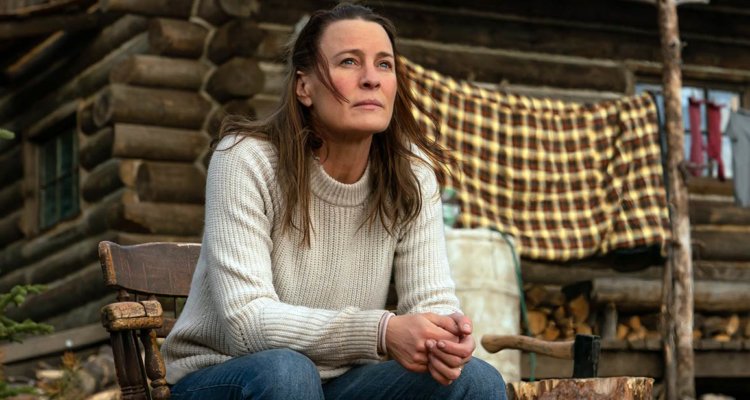After a renowned career of nearly four decades in both film and TV, actor Robin Wright makes a confident feature directorial debut with “Land,” screening this year as part of Sundance Film Festival’s Premieres line-up. An assured, brawny film that melds together a character study, a friendship tale, and a story of survival inside a modern-day Western of sorts, “Land” follows Edee (Wright), a woman that goes off the grid to a mountain in Wyoming to make a fresh, solitary start after experiencing unspeakable tragedy. Caught off-guard by the elements and inexperienced to live off the land, she builds a trusting friendship with Miguel (Demián Bichir), a local man with his own emotional secrets who teaches Edee the basics of survival in the mountains.
READ MORE: 25 Most Anticipated 2021 Sundance Film Festival Premieres
There is fishing, deer skinning, wood splitting, and even an episode with a bear, which the crew had to experience first hand during their shoot that primarily took place on Moose Mountain, an 8,000-foot-peak by the Banff National Park in Canada. Before the festival premiere of “Land,” we spoke with Wright about the film’s themes around grief and redemption, gaining confidence to finally direct a feature as well as the subtle political timeliness of “Land.”
READ MORE: 52 Films Directed By Women To Watch In 2021
It feels really radical to see a movie about how a person hit with loss and trauma choosing her own terms to negotiate with grief. I don’t think this is a courtesy we afford to many people in our society. We put a lot of pressure on them.
I love that you are bringing this up, because it was one of the primary reasons for wanting to make this movie now, and that’s what resonates. We are facing adversity, and we have been for the last four years. And when the script came to me about three years ago, it was during the time of the random shootings that were happening almost bi-weekly.
READ MORE: The 100 Most Anticipated Films Of 2021
And I just was thinking about the amount of grief and loss and how someone deals with that when the life you have lived and have only known is ripped out from under you in a millisecond. And everybody deals with grief and loss differently. I loved that this is about one person’s journey through the phases of grief and coming out re-birthed with the help of a beautiful stranger, who helps her see that she has resilience. She can have a newfound faith and hope, and there is healing that can occur. And I do believe that we need other humans to help us through difficult times.
And the story truly evolves as you sit with it. At first, it was tempting to think of her act more gloomily. As in, she has given up on it all; she’s given up on humanity. But later on, you realize it has been an act of hope from the start. Something about putting your body through survival, and let your spirit catch up.
Yes, that was the intention. So I love that that’s how you received it, because it isn’t about a person wanting to end their life. They need to erase the life that they once knew, because it’s no longer working. She can’t exist, because that world doesn’t exist anymore. So when you have to recreate yourself somehow, someway, she basically honors her child’s greatest wish, which is where he wanted to live. That was his dream, to live in the mountains with his family, and honoring that, by going off the grid, kept her connected.
Our relationship with nature is at the heart of this film. I don’t think we often think of its humbling power our vulnerability against it. I don’t want to call it arrogance, but Edee is definitely blindsided by nature, which she has underestimated.
I guess you could say hubris on her part in the beginning, because this is a very alpha female. She’s a doer, and you can’t trust fully that reading six manuals is going to allow you to live successfully off the grid. And she learns that very quickly.
You have directed episodes of “House of Cards,” so this isn’t your first experience directing. But it’s still your debut in a feature film. I am wondering what took you so long to assume this role behind the camera?
I didn’t think I could do it. It was always in the recess of my mind, “Oh gosh, one day I would love to direct something.” But I just didn’t think I was capable. This was before I got the opportunity to direct “House of Cards.” And the minute I tasted it, I got the bug; I loved it so much. I love collaborating with all of the members, all the department heads, and all of the creative minds that are the architects of the same building. We’re all doing our part to direct the movie and create its vision. And I love collaborating with everyone, because acting is great, but it’s a very soloist act. You’re working with yourself pretty much most of the time.
Why didn’t you think you could do it prior to “House of Cards?”
I think just observing how many different hats you do have to wear as a director, you know? You’re also a producer, and you have to answer all these questions, so you better know your homework. And I started to gain more confidence as I was directing and learning about lenses, about framing. Directing actors, that just came naturally, because when you are one, you know how you like to be directed, you know? It was more the technical side that I felt a little reticent, but then I got to actually do it while being on the job at “House of Cards.” I had cinema school. So I couldn’t wait to delve into features once that show ended.

